
On feelings of utter outrage, sadness, ... hopelessly old and irrelevant ...
Am aware of having dropped some invisible internal control button to "dim" so that the horrendous pain of the loss of an entire culture is now occurring both inside and outside of me... Maybe Creole-Cajun life and history really does die with my generation .
The human loss is beyond comprehension. If I hear one more commentator give the body count as "147" right behind the mentions of "...bodies floating by, being abandoned in attics, left by the sides of roads and in SuperDome restrooms ...etc.," I'll scream! After all those uncounted bodies of the weak of the too young or too old or too black have been floating by now for almost a week! There are reports of rats being seen claiming the remains. The body count in the city of my ancestry and early childhood will surely rise to thousands in days to come. That is, if those who have been lost don't simply join the long list of unreported dead in the war of Iraq -- a fact that never really materializes into actual numbers.
Spent most of the past several days searching the web's survivor lists for cousins I can scarcely remember but feel deeply connected to by our common ancestry. They're so alive for me due to the countless hours spent in reconstructing that history -- from the 1500s to the present. It's gathered into two huge binders and on the walls of vintage photos that line the hallway of my apartment. Perhaps what I've collected over the years will become the family archives and the only record of this family's long tenure in the country and the world. Ours is the story of black America with all of its pain, anguish, and glory. "Up From Slavery" is a book title that I recall from my early years. Can't recall the author at the moment, but what it describes in those few words speaks volumes about where life's journey has taken the Allen/Charbonnet/Breaux clan. Katrina may have erased that record of our existence.
Not only are those ancestors who are so alive for me still, but the structures left by the builders of my family; my grandfather, Louis Charbonnet; my dad, Dorson Louis Charbonnet, and his seven brothers. I'm sure that Corpus Christi Catholic Church, designed and built by my grandfather many years ago -- and that I visited from California as a teen -- to discover it racially segregated with white New Orleanians occupying the middle pews and people who looked like me sitting on both sides. It's surely gone now in the rage of a hurricane called Katrina. And it's segregated history reduces its value to me not one iota. It is the system that was; and that may have exemplified for us a low point in our collective lives that may now be overcome because we've experienced another soul-shaking exposure of our sins. Maybe we can move now toward redemption.
Then there were our family homes on Laperouse, Frenchman, and Touro streets -- and the Convent of the Holy Family Sisters out on Gentilly (shown in photo above). Bill and I visited that Charbonnet-designed and constructed institution the year before he died. I remember now running my hand across the cornerstone bearing my grandfather's name and the dates hoping to remember the physical impression well enough to bring back alive to my blind father upon return to the Bay Area. This was the convent that housed the first African American nuns in the nation -- the Holy Family Sisters, an order dedicated to the care and education of black children at a time when there was little else. Surely it no longer stands since it was built not far from the Lake. It is my guess that those good sisters may well have remained in place as the water rose. They may have perished in service to their people and to "The Lord." The Order was still very much together when we visited -- complete with the little draped window near the heavily secured front doors -- through which frightened young girls could slip blanketed newborns without blame or guilt, to be raised by the nuns or placed out in the parish for adoption.
Most of my family's dead are entombed in above-ground crypts in St. Louis cemetary on the edge of St. Louis Cathedral in the French Quarter. The tears come as I wonder whether their graves -- some that date from the early 1800s -- still exist ...? The French Quarter may have held. I don't really know. Nearby Canal Street and some of that area that I can recognize as the cameras panned -- appears to be intact still.
My cousin, former Louisiana state senator, Louis Charbonnet, III, and his family have been evacuated to Baton Rouge. Other family members have been evacuated to Florida, Texas, and St. Louis, MO. His senatorial district included the French Quarter. His family's mortuary, "Charbonnet-Labat" which featured jazz funerals and red bean feeds in its parking lot on Mardi Gras Day -- surely was destroyed by Katrina. It was an important cultural landmark in the city they so loved.
But what is the most disturbing is that in the course of my work -- where I'm working hard to help to expand the WWII story to include that of African Americans (the story of Rosie the Riveter is a white story) -- I'm experiencing newly-activated anger at racial segregation and economic deprivation. Watching the horrific images being spat out non-stop from our television screens by what appears to be a newly-aware press corps revives mind pictures of slavery, lynchings, Selma, fire hoses, attack dogs, etc. The only comfort I can find is in the growing conviction that the numbers of outraged citizens of all colors, sizes, social and economic levels has grown exponentially and that this may usher in -- finally -- a time of reconciliation.
I find hope in the fact that newsmen and women -- on the spot -- were suddenly seeing new awful truths and awakening to what so many of us who've lived the history have always known; that the nation is deeply-divided and must ultimately come to terms with its shameful history in order to finally move toward love and compassion that crosses barriers of race, gender, and privilege. Perhaps in the days to come, they will be able to reflect this in reports on the most powerful system of communication the world has ever known. Maybe they can hurry the healing before it's too late ... .
Do you suppose there is any possibility that this sick country can take a page from President Nelson Mandela's book -- with the help of our newly-awakened media -- and create a Truth Commission and seek reconciliation?
But then the phenomenon of Katrina heralds a new age -- one in which nature's awesome power will continue to bring the world to its knees because the greed of man blinded him to the warnings of global warming before it was too late ... .
And in that knowing place deep within -- I -- quietly -- no longer envy the young.
...unless we manage to outlive or out-gun those currently in the seats of power in this nation. I no longer rule out the possibility of armed revolution -- something I could never imagine in my worse nightmares. Almost anything is possible in these times of such horrendous loss of our institutional underpinnings.
...and we're the "Leaders of the Free World!"
Photo: Convent of the Sisters of the Holy Family, New Orleans, Louisiana.
